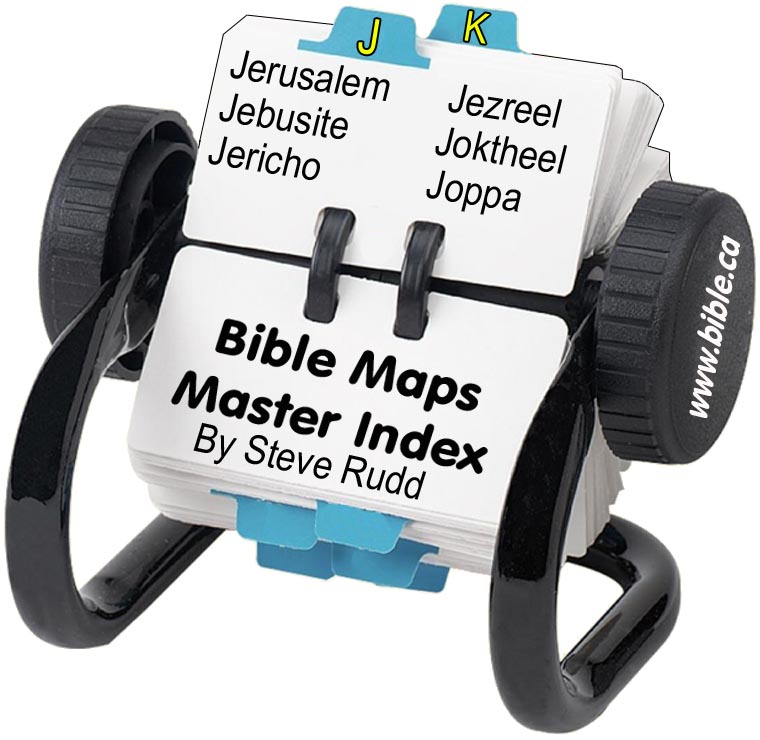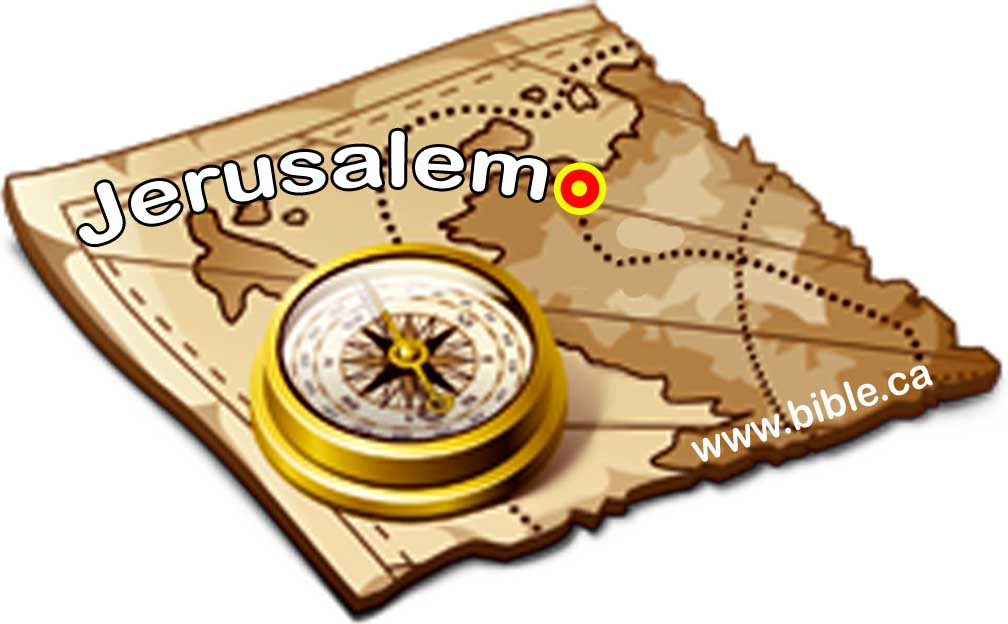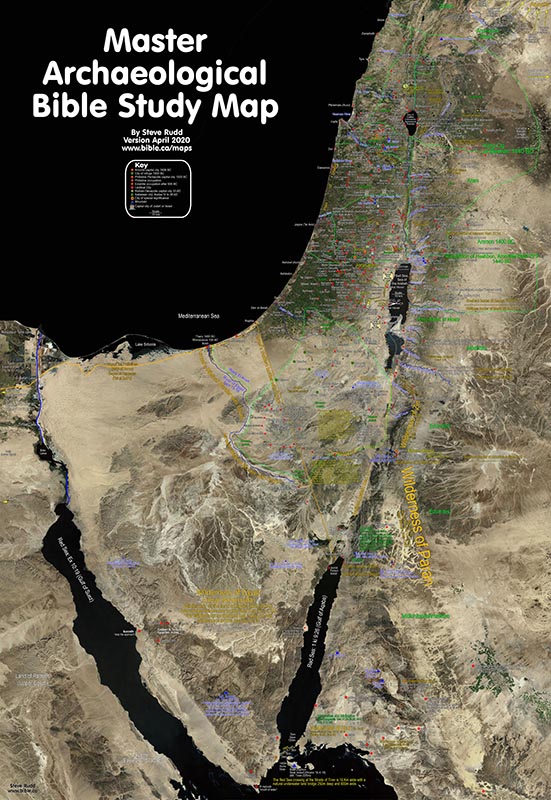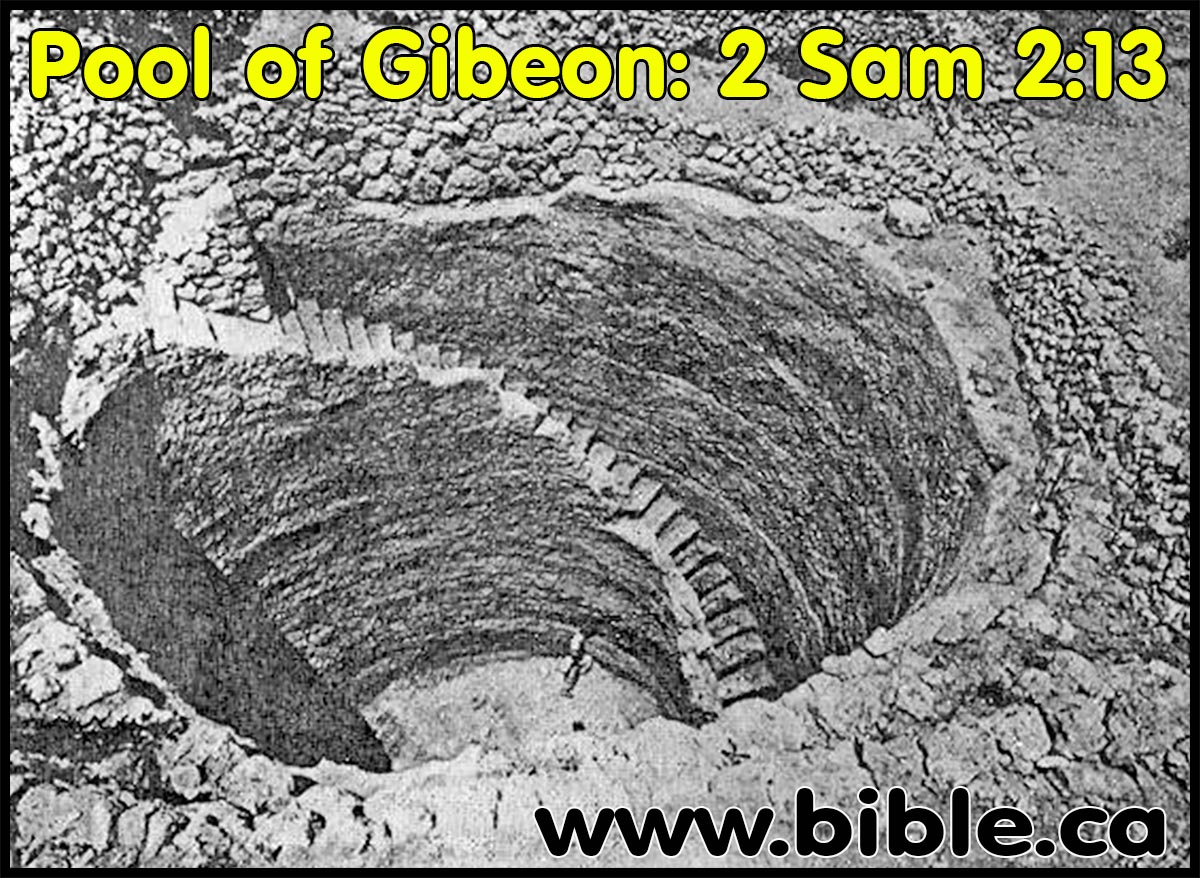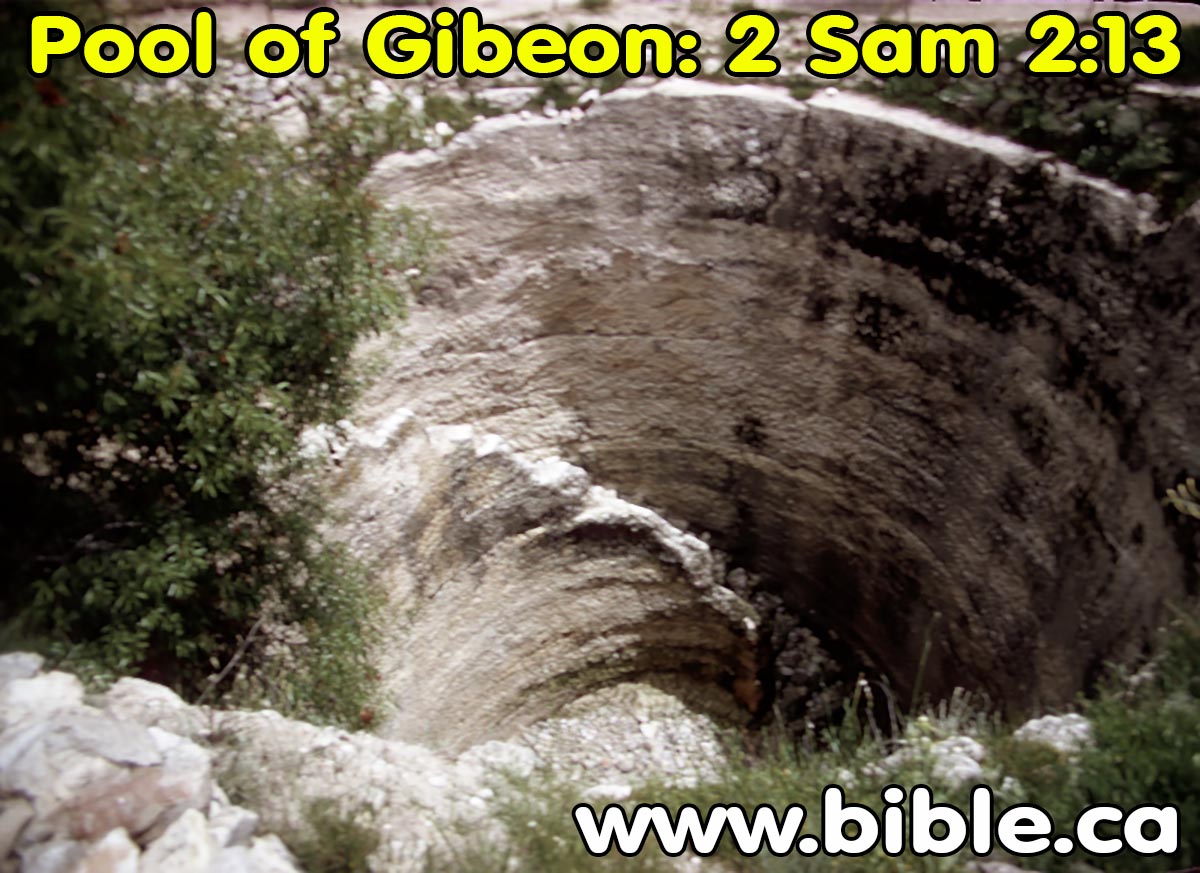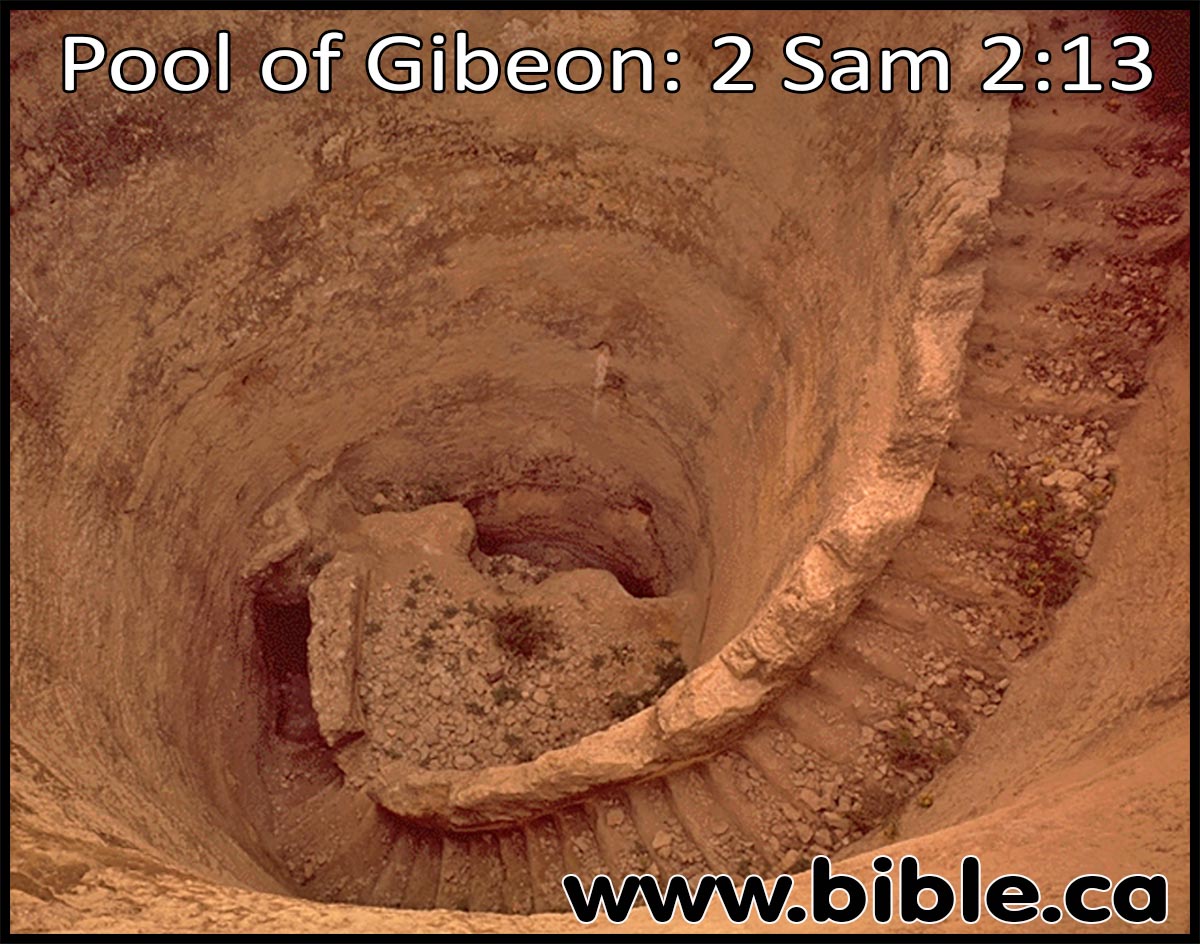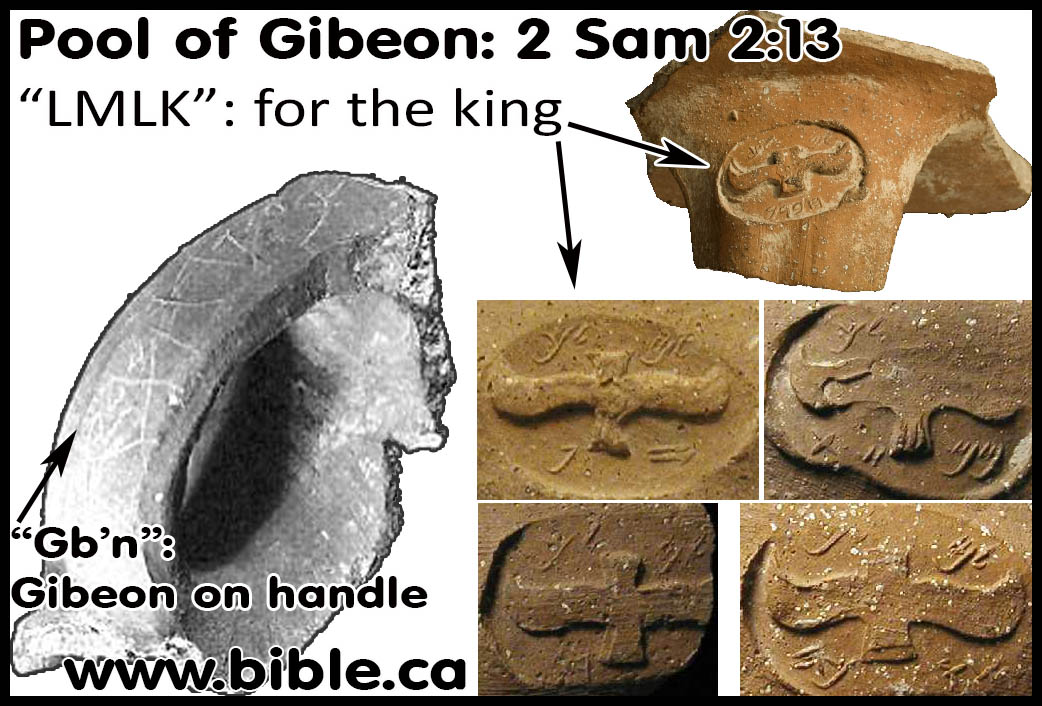Gibeon, Israel
(El Jib)
|
Site location: 8 km NNW of Jerusalem GPS: 31°50'47.38"N 35°11'5.66"E |
Gibeon, Israel (El Jib) (Click balloon for info, move with mouse) |
Events at this location:
1. Gibeon was a major city that was conquered by Joshua, but the Gibeonites wisely chose to trick Joshua into an oath that they would not be killed. In exchange, the Gibeonites became perpetual slaves of Israel. After Saul slaughtered the 70 priests at Nob, he moved the tabernacle of Moses to Gibeon. In preparation for this move, Saul killed a number of the gentile Gibeonites and banned mediums and spiritists. God later brought about a famine upon David after Saul died as a way to punish Israel for Saul's injustice. David hangs 7 of Saul's relatives at Gebeah of Saul as an atonement which pleased both God and the Gibeonites.
2.
The tabernacle
of Moses was in Gibeon from 1012 - 953 BC. Thee tabernacle of Moses was moved
to Gibeon after Saul murdered the high When David bought the temple site form
Ornan, the Mosaic tabernacle was located at Gibeon: “At that time, when David
saw that the LORD had answered him on the threshing floor of Ornan the
Jebusite, he offered sacrifice there. For the tabernacle of the LORD, which
Moses had made in the wilderness, and the altar of burnt offering were in the
high place at Gibeon at that time.” (1 Chronicles 21:28–29)
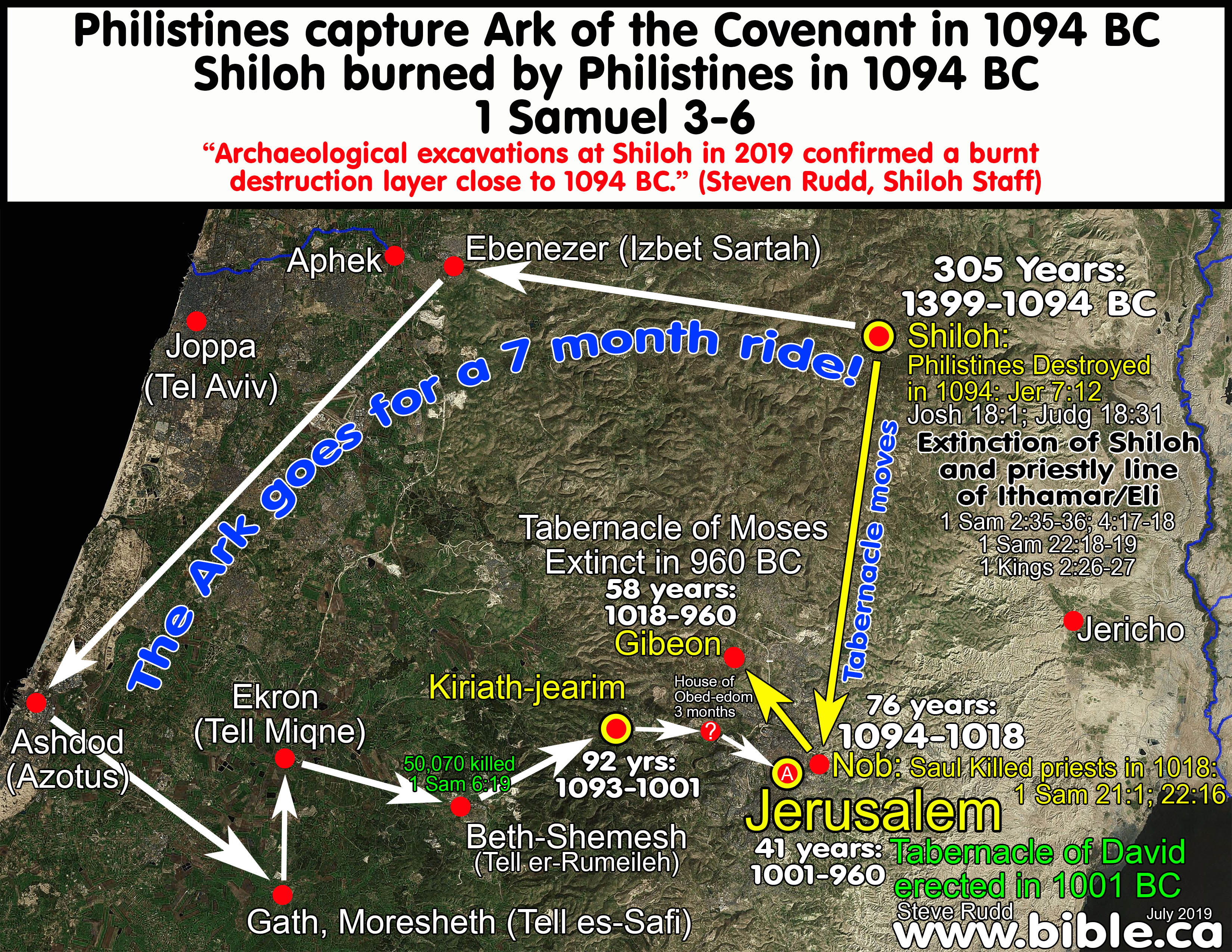
3.
Gibeon in a
Levitical city: Here is a panorama view of Gibeon from the top of Ramah, where
Samuel lived and oversaw the Mosaic Tent of Meeting from 1012-1008 BC until he
died. Saul had killed the priests and none officiated during this period. The
tabernacle of Moses would remain in Gibeon until it is taken down after it is
replaced by the new tabernacle of David in Jerusalem. Once the Temple is built
by Solomon, this tabernacle of Moses will be put in a room inside the Temple
for storage where it vanishes from recorded history forever.

4.
Here is a
panorama from the top of Gibeah of Benjamin where Saul's palace stood. You can
clearly see Samuel's home at Ramah 5 km away. Gibeon is just to the right of
Ramah:
![]()
5. During the civil war period between the house of David and the house of Saul, after Saul died and David was king in Judah at Hebron, a battle was fought at the pool of Gibeon. Joab (David's general) and his men sat on one side of the pool and Abner (Ish-bosheth's and the late Saul's general) and his men sat on the other edge of the circular pool. 12 men from each side were selected and they lined up 12 to 12 in a row and all 24 died being killed by each other. This is like what happened during the battle of 1812 AD when the Red coats and the Blue coats would line up with their guns and all fire at each other, killing all who were on the front lines of both sides.
6. Amasa (Absolom's general) was killed at Gibeon by Joab.
7. After Solomon becomes king, he offers 1000 sacrifices at Gibeon. God asks Solomon to "make a wish" and Solomon asks for wisdom instead of riches, while at Gibeon. “So Solomon went from the high place which was at Gibeon, from the tent of meeting, to Jerusalem, and he reigned over Israel.” (2 Chronicles 1:13)
8. After Solomon finished the temple in Jerusalem, it was in Gibeon that God appeared to him and promised to bless the temple. “The LORD said to him, “I have heard your prayer and your supplication, which you have made before Me; I have consecrated this house which you have built by putting My name there forever, and My eyes and My heart will be there perpetually.” (1 Kings 9:3)
9. Jeremiah is the last mention of Gibeon and the large pool where Joab and Abner battled.
Archeological information:
1. "Egyptian Pharaoh Sheshonk I (biblical Shishak—cf. 1 Kgs 14:25) included Gibeon in a list of cities either visited or captured in his late 10th century B.C. campaign into Palestine (ANET, 242). This entry is the earliest extrabiblical reference to Gibeon." (ABD, Gibeon)
2. "E. Robinson was the first modern scholar to present reasons for identifying Gibeon with el-Jib (1874: 455). Robinson argued that the site of el-Jib not only matched biblical topographical descriptions, but that the modern Arabic name of the village preserved the Hebrew toponym from antiquity as well. Robinson’s identification was widely accepted by scholars throughout the ensuing decades. The few remaining scholarly doubts regarding this identification were allayed after J. B. Pritchard’s excavations at el-Jib in 1956, 1957, 1959, and 1960. Included among the finds were thirty-one jar handles inscribed with the name “Gibeon” (gbʿn) in ancient Hebrew script (Cross 1962: 18–23)." (ABD)
3. Today, Gibeon is dangerous to visit being in the Islamic controlled town of El-Jib. I tried to get there in 2011 but the Israeli army refused to let me in for my own personal security reasons. Enter with caution and only with larger groups, possibly with armed guards or army escort.
Photo gallery and current archeology:
|
This is the photo of when the pool was first excavated in 1956-1960 by J. B. Pritchard. Here is an excavation photo. |
|
|
Pool of Gibeon in the 1990's. Today there is an iron fence surrounding the pool. |
|
|
The snail-like appearance of the spiral staircase goes underground and continues to the water source. |
|
|
"J. B. Pritchard’s excavations at el-Jib in 1956, 1957, 1959, and 1960. Included among the finds were thirty-one jar handles inscribed with the name “Gibeon” (gbʿn) in ancient Hebrew script" (ABD) |
Bible passages:
Joshua 9:3; Joshua 9:17; Joshua 10:1-2,4-6; Joshua 10:10; Joshua 10:12; Joshua 10:41; Joshua 11:19; Joshua 18:25; Joshua 21:17; 2 Samuel 2:12; 2 Samuel 2:13; 2 Samuel 2:16; 2 Samuel 2:24; 2 Samuel 3:30; 2 Samuel 20:8; 1 Kings 3:4; 1 Kings 3:5; 1 Kings 9:2; 1 Chronicles 8:29; 1 Chronicles 9:35; 1 Chronicles 14:16; 1 Chronicles 16:39; 1 Chronicles 21:29; 2 Chronicles 1:3; 2 Chronicles 1:13; Nehemiah 3:7; Nehemiah 7:25; Isaiah 28:21; Jeremiah 28:1; Jeremiah 41:12; Jeremiah 41:16
1. “When the inhabitants of Gibeon heard what Joshua had done to Jericho and to Ai,” (Joshua 9:3)
2. “Then the sons of Israel set out and came to their cities on the third day. Now their cities were Gibeon and Chephirah and Beeroth and Kiriath-jearim.” (Joshua 9:17)
3. “Now it came about when Adoni-zedek king of Jerusalem heard that Joshua had captured Ai, and had utterly destroyed it (just as he had done to Jericho and its king, so he had done to Ai and its king), and that the inhabitants of Gibeon had made peace with Israel and were within their land, that he feared greatly, because Gibeon was a great city, like one of the royal cities, and because it was greater than Ai, and all its men were mighty.” (Joshua 10:1–2)
4. ““Come up to me and help me, and let us attack Gibeon, for it has made peace with Joshua and with the sons of Israel.” So the five kings of the Amorites, the king of Jerusalem, the king of Hebron, the king of Jarmuth, the king of Lachish, and the king of Eglon, gathered together and went up, they with all their armies, and camped by Gibeon and fought against it. Then the men of Gibeon sent word to Joshua to the camp at Gilgal, saying, “Do not abandon your servants; come up to us quickly and save us and help us, for all the kings of the Amorites that live in the hill country have assembled against us.”” (Joshua 10:4–6)
5. “And the LORD confounded them before Israel, and He slew them with a great slaughter at Gibeon, and pursued them by the way of the ascent of Beth-horon and struck them as far as Azekah and Makkedah.” (Joshua 10:10)
6. “Then Joshua spoke to the LORD in the day when the LORD delivered up the Amorites before the sons of Israel, and he said in the sight of Israel, “O sun, stand still at Gibeon, And O moon in the valley of Aijalon.”” (Joshua 10:12)
7. “Joshua struck them from Kadesh-barnea even as far as Gaza, and all the country of Goshen even as far as Gibeon.” (Joshua 10:41)
8. “There was not a city which made peace with the sons of Israel except the Hivites living in Gibeon; they took them all in battle.” (Joshua 11:19)
9. “Gibeon and Ramah and Beeroth,” (Joshua 18:25)
10. “From the tribe of Benjamin, Gibeon with its pasture lands, Geba with its pasture lands,” (Joshua 21:17)
11. “Now Abner the son of Ner, went out from Mahanaim to Gibeon with the servants of Ish-bosheth the son of Saul.” (2 Samuel 2:12)
12. “And Joab the son of Zeruiah and the servants of David went out and met them by the pool of Gibeon; and they sat down, one on the one side of the pool and the other on the other side of the pool.” (2 Samuel 2:13)
13. “Each one of them seized his opponent by the head and thrust his sword in his opponent’s side; so they fell down together. Therefore that place was called Helkath-hazzurim, which is in Gibeon.” (2 Samuel 2:16)
14. “But Joab and Abishai pursued Abner, and when the sun was going down, they came to the hill of Ammah, which is in front of Giah by the way of the wilderness of Gibeon.” (2 Samuel 2:24)
15. “So Joab and Abishai his brother killed Abner because he had put their brother Asahel to death in the battle at Gibeon.” (2 Samuel 3:30)
16. “When they were at the large stone which is in Gibeon, Amasa came to meet them. Now Joab was dressed in his military attire, and over it was a belt with a sword in its sheath fastened at his waist; and as he went forward, it fell out.” (2 Samuel 20:8)
17. “The king went to Gibeon to sacrifice there, for that was the great high place; Solomon offered a thousand burnt offerings on that altar.” (1 Kings 3:4)
18. “In Gibeon the LORD appeared to Solomon in a dream at night; and God said, “Ask what you wish me to give you.”” (1 Kings 3:5)
19. “that the LORD appeared to Solomon a second time, as He had appeared to him at Gibeon.” (1 Kings 9:2)
20. “Now in Gibeon, Jeiel, the father of Gibeon lived, and his wife’s name was Maacah;” (1 Chronicles 8:29)
21. “In Gibeon Jeiel the father of Gibeon lived, and his wife’s name was Maacah,” (1 Chronicles 9:35)
22. “David did just as God had commanded him, and they struck down the army of the Philistines from Gibeon even as far as Gezer.” (1 Chronicles 14:16)
23. “He left Zadok the priest and his relatives the priests before the tabernacle of the LORD in the high place which was at Gibeon,” (1 Chronicles 16:39)
24. “For the tabernacle of the LORD, which Moses had made in the wilderness, and the altar of burnt offering were in the high place at Gibeon at that time.” (1 Chronicles 21:29)
25. “Then Solomon and all the assembly with him went to the high place which was at Gibeon, for God’s tent of meeting was there, which Moses the servant of the LORD had made in the wilderness.” (2 Chronicles 1:3)
26. “So Solomon went from the high place which was at Gibeon, from the tent of meeting, to Jerusalem, and he reigned over Israel.” (2 Chronicles 1:13)
27. “Next to them Melatiah the Gibeonite and Jadon the Meronothite, the men of Gibeon and of Mizpah, also made repairs for the official seat of the governor of the province beyond the River.” (Nehemiah 3:7)
28. “the sons of Gibeon, 95;” (Nehemiah 7:25)
29. “For the LORD will rise up as at Mount Perazim, He will be stirred up as in the valley of Gibeon, To do His task, His unusual task, And to work His work, His extraordinary work.” (Isaiah 28:21)
30. “Now in the same year, in the beginning of the reign of Zedekiah king of Judah, in the fourth year, in the fifth month, Hananiah the son of Azzur, the prophet, who was from Gibeon, spoke to me in the house of the LORD in the presence of the priests and all the people, saying,” (Jeremiah 28:1)
31. “So they took all the men and went to fight with Ishmael the son of Nethaniah and they found him by the great pool that is in Gibeon.” (Jeremiah 41:12)
32. “Then Johanan the son of Kareah and all the commanders of the forces that were with him took from Mizpah all the remnant of the people whom he had recovered from Ishmael the son of Nethaniah, after he had struck down Gedaliah the son of Ahikam, that is, the men who were soldiers, the women, the children, and the eunuchs, whom he had brought back from Gibeon.” (Jeremiah 41:16)
Master Index of Bible Study Maps: (600+ Bible places)
By Steve Rudd. Contact author with comments or questions.
